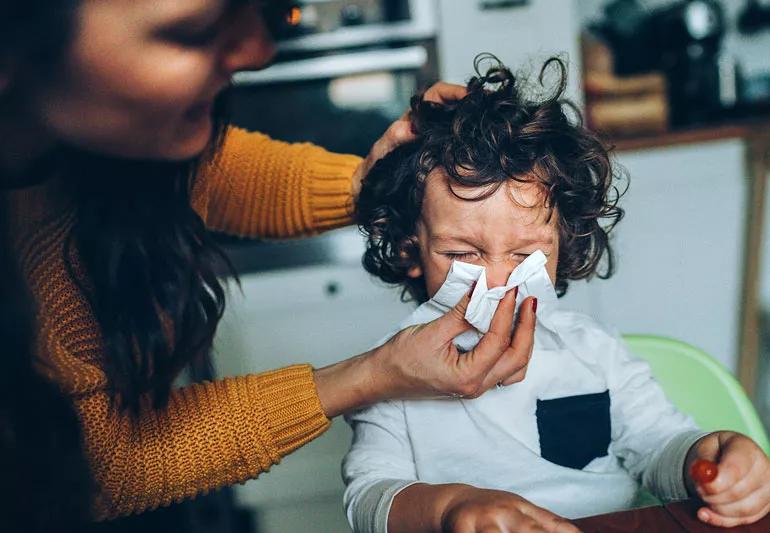Similar symptoms, different treatments

Welcome to cold and flu season. (Reminder: It’s not too late to get your flu shot!)
Advertisement
Cleveland Clinic is a non-profit academic medical center. Advertising on our site helps support our mission. We do not endorse non-Cleveland Clinic products or services. Policy
If your little one is already sniffling, coughing and sneezing, you might wonder whether it was a virus or bacteria that got them sick, and what you can do to help.
Sometimes the symptoms of viral and bacterial infections seem the same, but there’s a big difference between the two, and they’re treated differently, explains Frank Esper, MD, a pediatric infectious disease specialist.
Most often, it’s a virus that’s to blame for a child’s cough, sore throat or mild fever, he says. And the best thing to do is to let the illness run its course.
“For the most part, viruses go away on their own, as your immune system is more than enough to take them out,” he says.
But when a fever gets especially high, suspicion might shift to a bacterial infection. “With bacteria, a lot of times we use antibiotics for those, because bacterial infections can be more severe,” Dr. Esper explains.
While it can be frustrating for parents to learn that an antibiotic won’t help their child with a viral infection feel better, Dr. Esper says that overusing antibiotics, especially when they’re not useful, is problematic.
When we overuse antibiotics, the bacteria that they are meant to treat become more resistant, and those antibiotics are no longer useful.
Plus, Dr. Esper says, antibiotics can also destroy “good” bacteria in the gut, which can cause stomach and gastrointestinal upset.
Advertisement
“Your gut is full of bacteria — but, antibiotics do not know friend from foe,” he explains.
“It will kill the bad bacteria that’s causing a sinus infection, but it will also kill the good bacteria that’s in your gut that’s there to help you digest.”
If you’re unsure whether a child has a viral or bacterial infection, Dr. Esper said the best thing to do is to call their pediatrician.
He also reminds parents that any time a baby younger than 2 months old develops a temperature above 100.4, they should be seen by a physician.
Advertisement

Sign up for our Health Essentials emails for expert guidance on nutrition, fitness, sleep, skin care and more.
Learn more about our editorial process.
Advertisement

They’re viral cousins, but enteroviruses are more likely to cause serious illness

You can’t cure a cold, but these simple home remedies can help you feel better faster

Don’t expect miracles out of ‘immune-boosting’ supplements when you’re sick

Sinus infections tend to last longer and include symptoms like facial pressure and discolored mucus

Enteroviruses are often to blame for summer colds, leading to a runny nose, sore throat and digestive symptoms

Stress and unhealthy habits can lead to more colds, but taking some precautions may help you stay well

On their own, honey can help soothe a sore throat and garlic has immunity-boosting properties, but you don’t need to go the fermented route

Symptoms can overlap and be hard to distinguish, but there are some telltale differences

Even small moments of time outdoors can help reduce stress, boost mood and restore a sense of calm

A correct prescription helps your eyes see clearly — but as natural changes occur, you may need stronger or different eyeglasses

Both are medical emergencies, but they are very distinct events with different causes